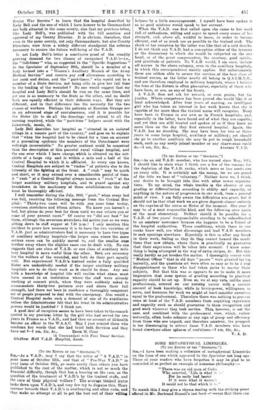THE WOMAN'S SENIOR WAR SERVICE. [To THE EDITOR Of THE
" SPECTATOR."] SIR,—I feel sure it will be of interest to all who have followed the letters in the Spectator dealing with the subject of "The Woman's Senior War Service" to learn that the hospital described by Lady Bell and the one of which I have honour to be Commandant are both situated in the same county, also that my previous letter, like Lady Bell's, was published with the full sanction and approval of my County Director. It is obvious, therefore, that even in the same county, not only Commandants, but also County Directors, view from a -widely different standpoint the reforms necessary to ensure the future well-being of the V.A.D.
Is not Lady Bell's letter a conclusive proof of the steadily
growing demand for two classes of recognized V.A.D.'s—i.e., the "full-timer " who, as suggested in the "Specific Suggestions " in the Spectator of September 28th, should be a member of a body formed into a " Women's Auxiliary Branch of the Army Medical Service" and receive pay anA allowances according to her rank and duties, and the " part-timer," who wpuld not be a member of a State Service, not being able to give her full time to the tending of the wounded P No one would suggest that my hospital and Lady Bell's should be run, on the same lines, and yet one is as necessary to the State as the other, and no doubt both are equally efficient in their different ways. But they are different, and in that difference lies the necessity for the two classes of workers. Perhaps the patients at Rounton Grange are in an advanced stage of convalescence, and it is possible for the Sister ijc to do all the dressings and attend to all the nursing required, while the " part-time " helpers assist with the housework, meals, &c.
Lady Bell describes her hospital as " situated in an isolated village in a remote part of the country," and goes on to explain that "when the hospital had to be closed for a time on account of a prevailing epidemic the members of the Detachment were well-nigh inconsolable." No greater contrast could be conceived than the description of this peaceful rural village hospital, and the one over which I have charge, which is situated on the out- skirts of a large city and is within a mile and a half of the Central Hospital to which it is affiliated. As every one knows, Central Hospitals are subject to "rushes" of patients due to the intensity of the fighting at the front. A " rush " may be quick and short, or it may extend over a considerable period of time. A " rush " ak a Central Hospital always means a " rush " at the larger auxiliary military hospitals, and to guard against any ' breakdown in the machinery of these establishments the staff must be thoroughly efficient.
I well remember during the July, 1916, "push," when every bed was full, receiving the following message from the Central Hos- pital: "Thirty-two cases will be with you some time to-day, seventeen stretchers and fifteen sitters. We know you haven't a bed, but please do your best for them until we can relieve you of some of your present cases." Of course we "did our best " for them, although the seventeen stretchers did arrive just as we were sitting down to staff supper at 7.30 p.m.! I only mention this incident to prove how necessary it is to have the two varieties of V.A.D. just as administrators find it necessary to have two types of auxiliary military hospitals—the larger ones where the more serious cases can be quickly moved to, and the smaller ones farther away where the slighter cases can be dealt with. No ore suggests that one class of V.A.D. or one class of auxiliary mili- tary hospital is more useful than the other. Both are necessary for the welfare of the wounded, and both do their part equally well. But experienced V.A.D.'s trained under a fully qualified Sister are undoubtedly needed if the larger auxiliary military hospitals are to do their work as it should be done. Any one with a knowledge of hospital life will realize what chaos must have ensued in an institution where the staff were already working at concert pitch, when they were suddenly asked to accommodate thirty-two patients over and above their full strength, had there not been in residence a thoroughly competent set of people prepared to deal with the emergency. Also would a Central Hospital make such a demand of one of its auxiliaries unless the Administrator felt that his trust in its administrative powers would be justified P I think not.
A good deal .of exception seems to have been taken to the remark quoted in any previous letter by the girl who had served for two
years in France as a and had then on account of ill-health become an officer in the W.A.A.C. May I just remind those who condemn her words that she had tried both Services and they
have not 1)—I am, Sir, &c., Berra M. Cu,s.
(A Commandant with Four Years' Service). Gledhow Han V.A.D. Hospital, Leeds.



































 Previous page
Previous page